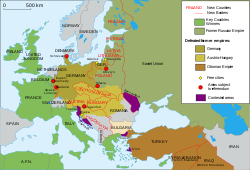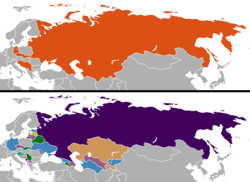Balkanization
This article has multiple issues. Please help improve it or discuss these issues on the talk page. (Learn how and when to remove these template messages)
|

Balkanization or Balkanisation is the process involving the fragmentation of an area, country, or region into multiple smaller and hostile units.[1][2] It is usually caused by differences in ethnicity, culture, religion, and some other factors such as past grievances.
The term was first coined in the early 20th century, and found its roots in the depiction of events during the Balkan Wars (1912–1913) and World War I (1914–1918), specifically referring to incidents that transpired earlier in the Balkan Peninsula.[3]
The term is
Origins of the term
Coined in the early 20th century, the term "Balkanization" traces its origins to the depiction of events during the
Nations and societies


The term (coined in the early 20th century in the aftermath of the collapse of the
Uses to stir opinion
Countries in Europe, where uniting quite recently historically distinct peoples or nations, have seen outspoken separatists. These have prompted
Canada is a stable country but has separatist movements, the strongest of which is the
Quebec has been the scene of a small but vociferous
In January 2007, the growing support for Scottish independence made Chancellor of the Exchequer of the United Kingdom and later Prime Minister Gordon Brown talk of a "Balkanisation of Britain".[10] Independence movements in the United Kingdom also exist in England, Cornwall and Northern England (themselves parts of England), Wales, and Northern Ireland.
In Africa

Bates, Coatsworth & Williamson argued Balkanization was observed greatly in West Africa then
Economic stagnation ended only in the mid-1990s. Countries within the region started to input more stabilization policies. What was originally a high exchange rate eventually fell to a more reasonable exchange rate after devaluations in 1994. By 1994, the number of countries with an exchange rate 50 percent higher than the official exchange rate had decreased from 18 to four.[12] However, there is still limited progress in improving trade policies within the region, according to van de Walle. In addition, the post-independent countries still rely heavily on donors for development plans. Balkanization still has an impact on today's Africa. However, this causation narrative is not popular in many circles.
In the Levant
During the 1980s, the Lebanese academic and writer Georges Corm used the term balkanization to describe attempts by supporters of Israel to create buffer states based on ethnic backgrounds in the Levant to protect Israeli sovereignty.[13] In 2013 the French journalist Bernard Guetta writing in the Libération newspaper applied the term to:
See also
- Balkan Wars
- Balkan Federation
- Breakup of Yugoslavia
- Cuius regio, eius religio
- Cyber-balkanization
- Detachment (territory)
- Dissolution of the Ottoman Empire
- Dissolution of Austria-Hungary
- Dissolution of the Soviet Union
- Divide and rule
- Feudal fragmentation
- Kleinstaaterei
- Lebanonization
- Pillarisation
- Protracted social conflict
- Secession
- Self-determination
- Self-governance
- Shatter belt (geopolitics)
- Sovereignty
- Treaty of Sèvres
- Treaty of Trianon
- Westphalian sovereignty
References
Citations
- ISBN 978-1-4051-2433-1.
- ^ "The A to Z of international relations". The Economist. Retrieved 2023-11-23.
- ^ ISBN 978-3-030-77954-2, retrieved 2023-11-23
- ^ Todorova 1994.
- ^ a b Simic 2013, p. 128.
- ^ Gosar 2000.
- ISBN 978-3-030-77953-5, retrieved 2023-11-23
- ^ Pringle 2016.
- ^ a b McLean, Renwick (29 September 2005). "Catalonia steps up to challenge Spain". The New York Times. Archived from the original on 16 October 2017. Retrieved 15 October 2017.
- ^ "UK's Existence is at Risk – Brown". BBC News. 13 January 2007. Archived from the original on 15 October 2017. Retrieved 15 October 2017.
- ^ a b Bates, Coatsworth & Williamson 2007.
- ^ Van de Walle 2004.
- ^ Corm, Georges (January 1983). "La balkanisation du Proche-Orient" [The balkanization of the Middle East]. Le Monde diplomatique (in French). pp. 2–3. Archived from the original on 22 February 2019.
- ^ a b Guetta, Bernard (28 May 2013). "La balkanisation du Proche-Orient" [The balkanization of the Middle East]. Libération.fr (in French). Archived from the original on 28 September 2019. Retrieved 28 September 2019.
Bibliography
- Gosar, Anton (2000). "The Shatter Belt and the European Core – A Geopolitical Discussion on the Untypical Case of Slovenia". GeoJournal – Spatially Integrated Social Sciences and Humanities. October vol. 52, 2 (2): 107–117. S2CID 140390836.
- S2CID 85549248.
- Pringle, Robert W. (2016). "Balkanization". Encyclopædia Britannica. Retrieved 15 October 2017.
- Simic, Predrag (2013). "Balkans and Balkanisation: Western Perceptions of the Balkans in the Carnegie Commission's Reports on the Balkan Wars from 1914 to 1996". Perceptions. 18 (2): 113–134. ISSN 1300-8641.
- Van de Walle, Nicolas (2004). "Economic Reform: Patterns and Constraints". In Gyimah-Boadi, E. (ed.). Democratic Reform in Africa: The Quality of Progress. Boulder, Colorado: Lynne Rienner Publishers. pp. 29–63. ISBN 978-1-58826-246-2.
- Vidanović, Ivan (2006). Rečnik socijalnog rada (in Serbian). Udruženje stručnih radnika socijalne zaštite Srbije; Društvo socijalnih radnika Srbije; Asocijacija centra za socijalni rad Srbije; Unija Studenata socijalnog rada. ISBN 978-86-904183-4-3.
- Todorova, Maria (1994). "The Balkans: From Discovery to Invention". Slavic Review. 53 (2): 453–482. S2CID 163474839.
External links
 The dictionary definition of Balkanization at Wiktionary
The dictionary definition of Balkanization at Wiktionary

